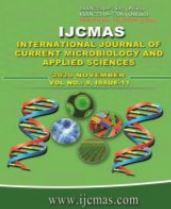


 National Academy of Agricultural Sciences (NAAS)
National Academy of Agricultural Sciences (NAAS)

|
PRINT ISSN : 2319-7692
Online ISSN : 2319-7706 Issues : 12 per year Publisher : Excellent Publishers Email : editorijcmas@gmail.com / submit@ijcmas.com Editor-in-chief: Dr.M.Prakash Index Copernicus ICV 2018: 95.39 NAAS RATING 2020: 5.38 |
Integrated Farming System (IFS) for wetland situation experiments were conducted in Southern block of Agricultural Research Station, Bhavanisagar during 2013 to 2017 under All India Co-ordinated Project on Irrigation Water Management. The objective of the experiment was to work out the water requirements for cropping and livestock components in IFS under wetland situation. In Conventional farming system (CFS), Rice - Rice – Pulse cropping system was followed in one-hectare area. In wetland IFS, Rice - Rice – Pulses (8000 m2), Cumbu Napier grass (1500 m2), Fish pond (300 m2) and others (200 m2) [Dairy unit (2 cows), Poultry unit (30 desi birds), Pigeon unit (10 pairs), Duck (30 birds)].In IFS, rice crop was cultivated in System of Rice Intensification (SRI) method. Rice (IW Ponni), Pulse (Greengram - CO6) and Cumbu Napier grass (CO(CN)4) were used for experiment. The wetland IFS recorded lower water consumed (20454 m3) compared to CFS (29620 m3). The higher gross income of Rs.527825/-, physical water productivity (3.68 kgm-3) and economic water productivity (25.80 Rs.m-3) recorded under IFS compared to CFS. It was concluded that the IFS not only influenced the yield but also higher irrigation water productivity. Moreover, benefit-cost ratios with different discount rates indicated that IFS in wetland situation is economically significant.
 |
 |
 |
 |
 |